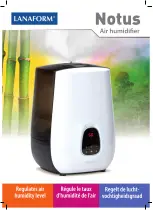
TROUBLESHOOTING GUIDE
Trouble
Probable Cause
Remedy
Digital display not illuminated.
No Power.
Power button has not been
depressed.
• Check 120 volt power source.
• Press power button once to
turn on.
Fan not operating (digital display
is illuminated).
ROOM humidity level is not 3% or
more below SET humidity level.
Reservoir is empty.
• Raise SET humidity level if desired.
• Increase fan speed.
• Fill humidifier with water.
Unit does not operate on any
speed setting
No power to unit.
Ensure polarized plug is fully inserted
in wall outlet.
Unit has run out of water – fan
will not operate without water is
present.
Refill reservoir.
Refill switch operation/improper
positioning of float assy.
Ensure float assembly is correctly
positioned as described in
“Important Filling Instructions”, page 4.
Motor does not turn on.
Check motor/fan operation.
CAUTION: Do not touch the fan
when accomplishing this test, as
the motor may turn on.
To test the motor, turn unit ON and
turn all knobs fully ON.
Turn the chassis over and insert
finger into tab where float rod is
supposed to go. If fan turns on, the
fan and motor are working correctly.
If unit has overheated, motor
temp-sensing fuse may have
tripped.
Take unit to authorized service
station. DO NOT ATTEMPT electrical
repairs yourself.
Wick may be installed
incorrectly
Remove and reinstall wick correctly.
Not enough humidity
Wick is old and ineffective.
Humidistat is not set high
enough.
Replace wick when clogged or
hardened with minerals.
Increase humidity setting on control
panel.
Too much humidity.
(Condensation becomes heavy
on cold surfaces in room)
Humidistat is set too high.
Reduce humidistat setting or
increase room temperature.
Water leak
Cabinet may have been overfilled.
There is a safety overflow hole in
rear of cabinet.
DO NOT OVERFILL cabinet. Correct
water level is indicated inside of
cabinet side wall.
Odor
Bacteria may be present.
Clean and disinfect cabinet following
Care and Maintenance instructions.
Add EPA registered Bacteria
Treatment according to instructions on
the bottle.
It may be necessary to replace the
wick if odor persists.
9










































